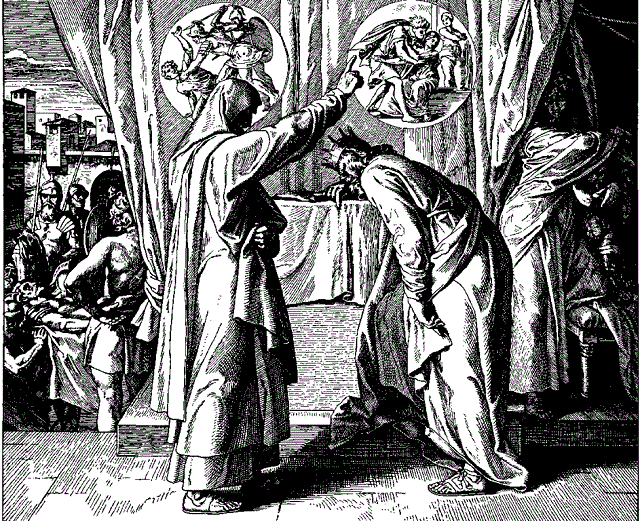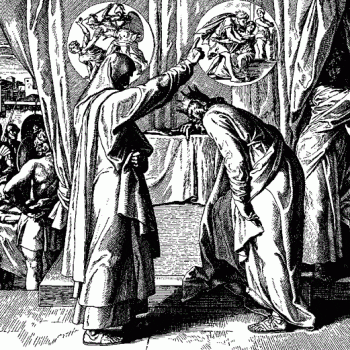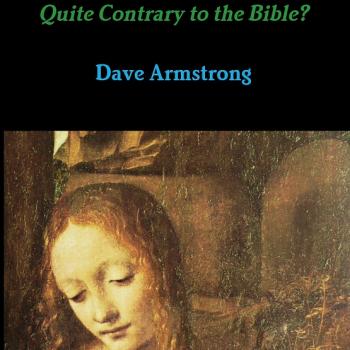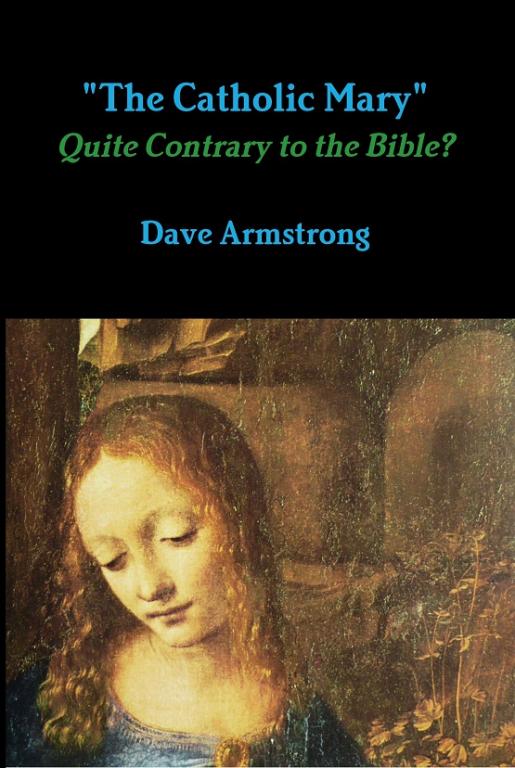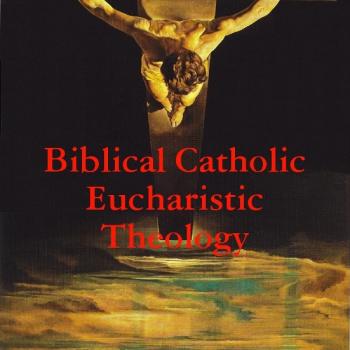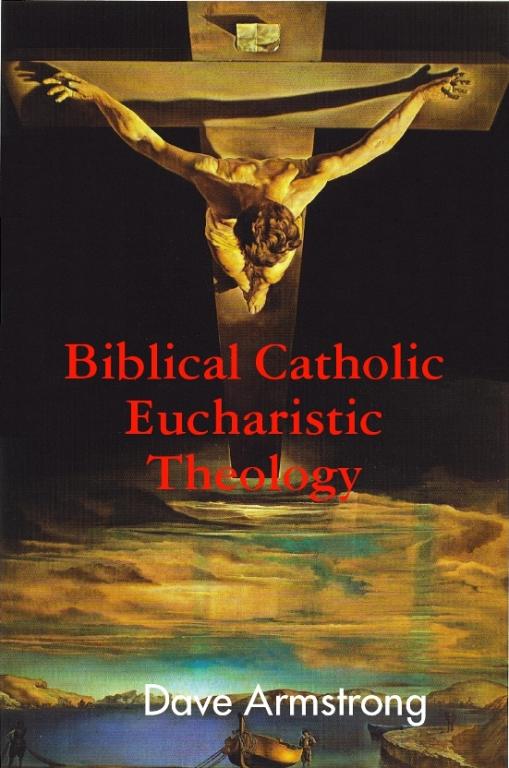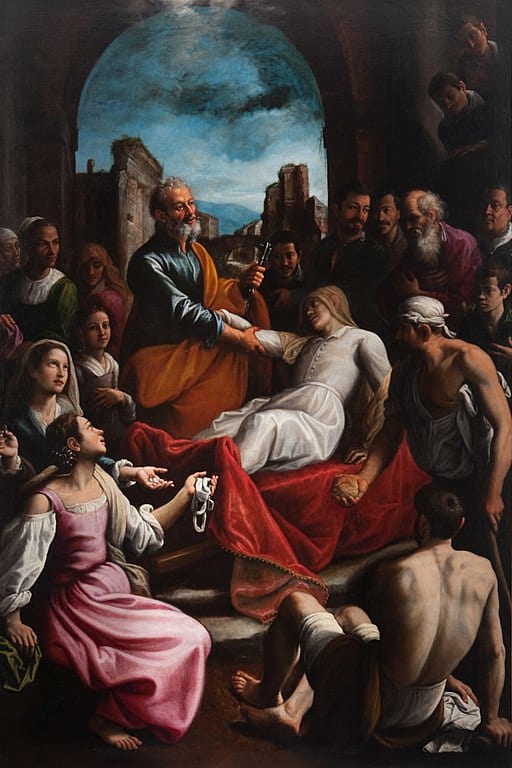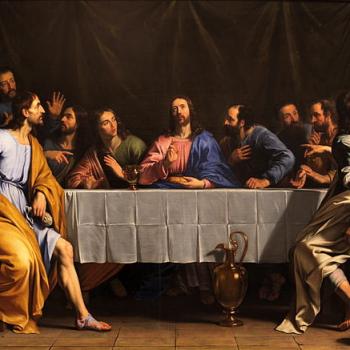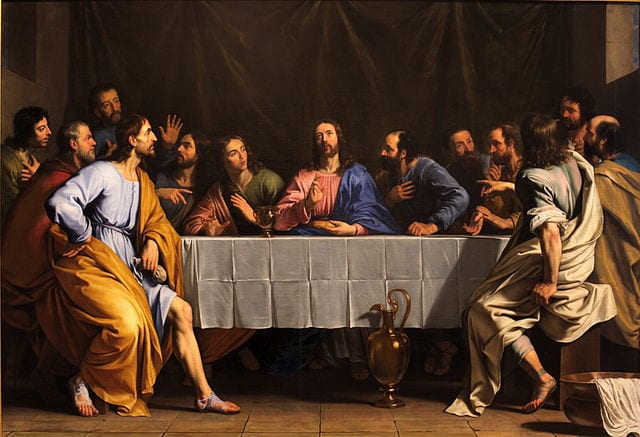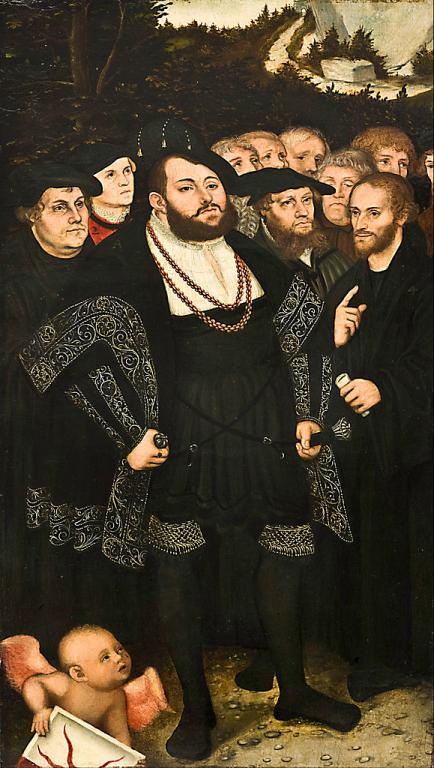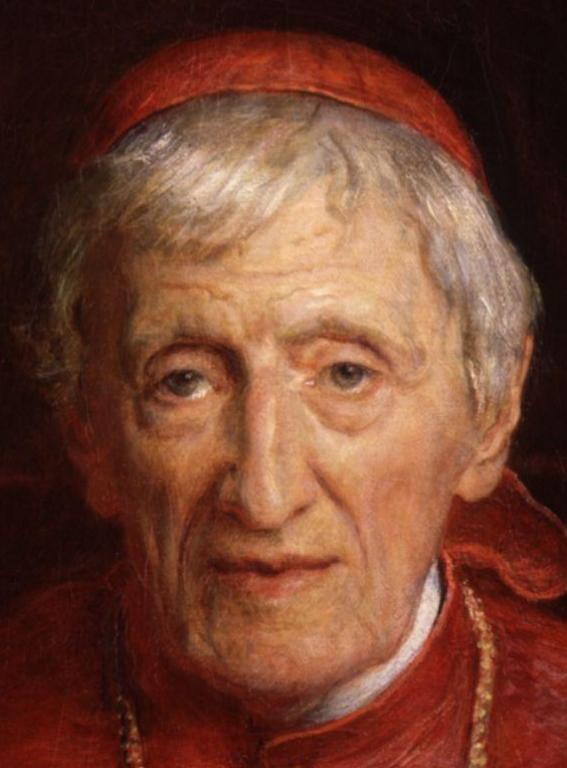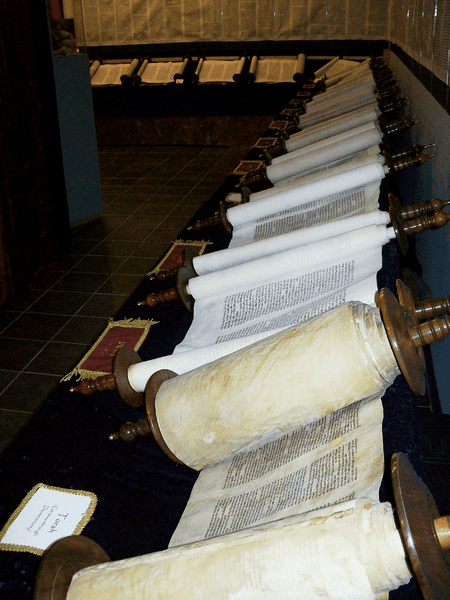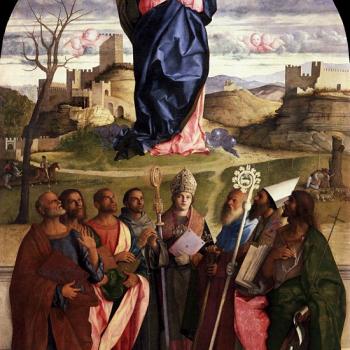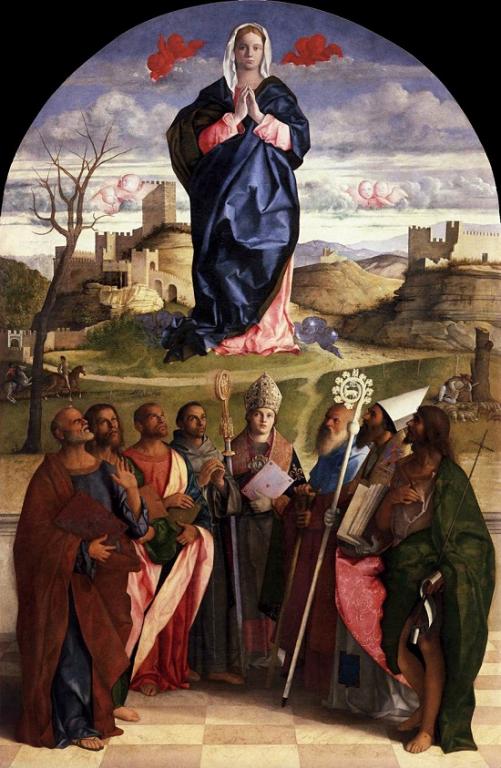Reply to an Evangelical Spoof of Catholic Eucharistic Beliefs

Way back in 1991, the year I was received into the Catholic Church, an evangelical friend of mine (who was raised as a Catholic), who also worshiped at my non-denominational church, wrote a satirical spoof against Catholic belief in the Real, Substantial, Physical Presence of Jesus in the Eucharist. He did this by concentrating on Jesus saying “I am the door” (John 10:9).
By satirizing that as intending to be literal, he went after, by analogy, the literal interpretation of Catholics with regard to the Last Supper utterances of Jesus and the statements of Jesus in His discourse in John 6 about eating His flesh and drinking His blood (whereas earlier in the same chapter He spoke symbolically, as we agree, saying, “I am the bread of life”). It was clever, and well done, as satire goes, but ultimately flawed and fallacious, as I revealed, I think, in my counter-satire.
He called his piece, The Thuran Doctrine, Rediscovered (utilizing the Greek word for door: thura). It ran to nine single-spaced typed pages. Without missing a beat, I responded with The Sarxon Fallacy, Refuted (9-6-91): the Greek word for flesh being sarx. My piece was 14 pages of single-spaced handwriting (I was still writing with a typewriter back then, and was not yet online: that would be in 1996). It is probably my longest extended satire (and I’ve done a fair amount of that). I thought it was about time to post it on my site, after more than 16 years of sitting in a file.
My friend never responded back. Too bad. I think the next round of (non-satirical, substantive) discussion would have been very fascinating and interesting (and actually constructive), had he been willing to participate. Through the years I have repeatedly been frustrated by Protestants who might go “one round” in discussion over serious disagreements, but then suddenly stop if the Catholic comes up with any good arguments that don’t have a ready-made Protestant response.
Here is my summary of his satirical arguments (in blue), as I don’t have permission to post his words verbatim:
1) John 10:1-9:
Truly, truly, I say to you, he who does not enter the sheepfold by the door but climbs in by another way, that man is a thief and a robber; but he who enters by the door is the shepherd of the sheep. To him the gatekeeper opens; the sheep hear his voice, and he calls his own sheep by name and leads them out. When he has brought out all his own, he goes before them, and the sheep follow him, for they know his voice. A stranger they will not follow, but they will flee from him, for they do not know the voice of strangers.” This figure Jesus used with them, but they did not understand what he was saying to them. So Jesus again said to them, “Truly, truly, I say to you, I am the door of the sheep. All who came before me are thieves and robbers; but the sheep did not heed them. I am the door; if any one enters by me, he will be saved, and will go in and out and find pasture.
2) Jesus used the word paroima (proverb) to describe His teaching; therefore, it was literal truth, not fiction.
3) Some of the Pharisees thought Jesus was mad by claiming to be a door.
4) To confirm this saying, Jesus passed through a “door” after His resurrection (John 20:19).
5) Noah’s Ark had a single door, for all to pass through (Gen 6:16).
6) The door theme reappears in the institution of Passover: Exodus 12:7:
Then they shall take some of the blood, and put it on the two doorposts and the lintel of the houses in which they eat them.
7) Similar motifs appear elsewhere in the Law: Deuteronomy 11:19-20:
And you shall teach them to your children, talking of them when you are sitting in your house, and when you are walking by the way, and when you lie down, and when you rise. And you shall write them upon the doorposts of your house and upon your gates, (cf. Deut 29:12; 28:6; Ex 21:6)
8) The veil of the Tabernacle (Ex 26:31-33) functioned as a door and represented Jesus Himself, because it was torn when He died (Lk 23:45).
9) Various offerings were presented to God at the door of the Tabernacle (Lev 1:3-5; 3:1-2; 4:1-7; 16:7).
10) Lepers were brought to the door of the Tabernacle for cleansing (Lev 14:11, 23).
11) The similar notion of “gate” appears in the Psalms:
Open to me the gates of righteousness, that I may enter through them and give thanks to the LORD. This is the gate of the LORD; the righteous shall enter through it. I thank thee that thou hast answered me and hast become my salvation. The stone which the builders rejected has become the head of the corner. (Psalm 118:19-22)
12) Jesus told us to enter by the narrow door (Lk 13:24).
13) The Bible speaks of “entering” into God’s rest and the Holy of Holies (Heb 4:5; 10:19).
14) The “Thuran Doctrine” was first given to Jews (Rom 1:16) and then Gentiles (Acts 14:27).
15) The door of the Temple even figures into the new age of the Church:
Now Peter and John were going up to the temple at the hour of prayer, the ninth hour. And a man lame from birth was being carried, whom they laid daily at that gate of the temple which is called Beautiful to ask alms of those who entered the temple. Seeing Peter and John about to go into the temple, he asked for alms. (Acts 3:1-3; cf. 3:6)
16) Acts 14:27 refers to a “door of faith”.
17) Paul refers to a door that opened up to him in Ephesus (1 Cor 16:9) and speaks of “a door of the Word” (Col 4:3).
18) The doctrine seems to have been inexplicably lost to later Church history (after the third century), and the “door” motif was taken to be simple allegory. It’s notable, however, that Martin Luther began the Reformation and restoration of the Gospel by posting his 95 Theses on a door of a Church in Wittenberg, Germany.
19) But, truth be told, we must accept in faith the fact that Jesus Christ is really, truly and substantially present under the appearance of a door. As He became flesh in the incarnation, so He also remains as a door, to bless us and be with us for all times. To deny this is to also deny the incarnation. If there is no door, there is no way to enter heaven, and no resurrection, either.
20) A change of substance occurs in the door when Jesus becomes present. What was once wood, brass, or iron has become the flesh and blood of Jesus, under the form of a door. We can’t go by our senses. As Jesus changed water into wine, so He can transform a door into Himself. Knowing this, we must worship the Holy Door as God Himself.
21) The door should be made of wood (preferably olive wood) but any material is proper, as long as opaque.
22) The Thuran Doctrine is not illogical, as some charge, but rather, it is above logic. God’s ways are higher than our own, and some things are beyond our ability to comprehend.
23) Nature offers analogies: for example, the caterpillar is transformed into a butterfly. Matter can be transformed into energy. A thing is what God says it is. Who are we to question that?
24) Christ is whole and entire in every part of the door: wood, hinges, and knob.
25 Holy Communion could be said to closely parallel the Thuran Doctrine. What has been written above about the Holy Door may also be said about the Eucharist.
* * * * *
There you have the gist of my friend’s clever, hard-hitting satire. I trust that Catholics (and Protestants) will see exactly what he was driving at. This cynical, anti-sacramental presentation begged for a satirical response, and I provided it. First, I wrote a personal letter to my friend, explaining exactly what I would be attempting to do in my reply:
I commend you for a truly inventive, humorous, and original piece of satire. Far be it from me to deny your work’s value as satirical farce, from a strictly literary perspective. I’ve done some of this type of work too, in the past, as you probably know.
So inspired was I by your creative ability, that I wrote a response at a furious pace in the space of one day. At first I thought I would respond in a serious fashion, revealing the logical and exegetical fallacies which abound in your work (after all, you are trying to make a point by using the technique of argumentum ad absurdum). All good satire attempts to make a point, as I’m sure you’re aware.
Upon reflection, however, I decided to fight farce with farce, much like Rush Limbaugh’s philosophy of “illustrating the absurd by being absurd.” Two can play at this game. It is great fun, but the issue at hand is, after all, an important issue in theology, by anyone’s reckoning. I, too, will be making a point in my work, which, surely can’t be missed, given my flamboyant style.
I believe your underlying premise, as far as I can tell (that literalism in the Eucharist is well-nigh ridiculous), is fallacious by three standards: exegetically, logically, and historically: if Church history counts for anything. I have decided. I oppose ludicrosity with more of the same.
My countering satirical piece was to be devoted to a farce about Jesus not having a body at all: the logical opposite of a Bodily, Substantial Presence in the Eucharist, and to subtly show that anti-matter Gnosticism is the logical reduction of a denial of a Substantial Eucharist, just as the latter is a reflection of the incarnation: Christ taking on flesh. I “turned the tables,” and showed how a denial of same was unbiblical (by the method of extreme satirical argument and reductio ad absurdum). “Anti-physicality” can be satirized, after all, just as easily as “excessive dependence on matter” can be.
*
My counter-spoof may also serve an illustration of the ways in which many heretical groups (cults that deny the Trinity) can distort Holy Scripture by interpreting it wrongly, and according to a preconceived pattern, picking out what they like, with utter disregard for context and background and the latitude in meanings of biblical words (as my friend’s piece also showed). I hope you enjoy it, and remember, neither I nor any orthodox Catholic believes the following; it is a satire; a spoof.
* * *
The Sarxon Fallacy, Refuted
by Dave “Pneuma” Armstrong
— all verses RSV —
Many are the struggles in the history of the thousands of brands of Christianity (possessed of a hidden, mystical, esoteric “oneness” and “unity” that is incomprehensible to obscurantists who speak of a “Church”), to assert the superiority of spirit over flesh. Fools and upstarts, in trying to flesh out the true doctrine of Christ, have forsaken the spirit of the Gospels, and have fallen into pernicious errors, that have misrepresented the very heart and soul of the many invisibly united Christianities.
Just as the Soviet Union, though it appears diverse and fragmented, is actually one (Yugoslavia is another clear example of this mystical unity), so are all the multitudinous Christianities now extant, in contradistinction to that dreaded, imbecilic dinosaur known as “Catholicism.” But we are straying from our intended subject matter.
There is a constant annoying tendency throughout history, among many so-called Christians, to emphasize the flesh at the expense of the spirit, which is self-evidently superior to not only flesh, but to all matter whatsoever. Thus we observe “Christians” building magnificent churches. shrines, etc., completely missing the point that matter is evil.
The Catholics, who seem to revel in this idolatrous orgy of matter-worship, have reached ridiculous heights of absurdity in this respect, even to the extent of worshiping statues, wafers, and pieces of hair, bones, etc., which they call “relics.” How could men have stooped to such a low level, when the truth is plain to see in the pages of Scripture? The gullibility of religious zealots is truly amazing and tragic.
Despite the Holy Scriptures being crystal clear in this (as it is in everything, so that any and all can interpret it with no need of assistance save that of the Holy Spirit), we shall condescend for the sake of the ignorant and offer the scriptural proof presently. The key verse is:
John 4:24 God is spirit . . .
Other verses concur. For example:
2 Corinthians 3:17-18 Now the Lord is the Spirit . . . the Lord who is the Spirit.
Those verses speak of God in His totality and wholeness. This is not to say that God does not subsist in three Persons. We must not deny the Trinity, which is central to Christian theology. To understand this mystery of the faith as much as possible, we will examine it more closely, by looking at each of the three Persons.
The Father
***
God the Father is clearly an invisible Spirit:
John 5:37 . . . the Father . . . his form you have never seen;
1 Timothy 1:17 . . . the King of ages, immortal, invisible, the only God, . . .
1 Timothy 6:16 who alone has immortality and dwells in unapproachable light, whom no man has ever seen or can see. . . .
1 John 4:12 No man has ever seen God; . . .
The Holy Spirit
***
The Holy Spirit, obviously, is also an invisible Spirit; by definition a spirit is invisible. We need not offer scriptural proof.
Jesus Christ
***
It is here that corruption has crept into Christian theology. Most so-called Christians, especially the Catholics, fail to realize that Jesus, too, was a Spirit, since if He was not, this would introduce a contradiction into the trinitarian Godhead. Scriptural proof is simple enough to come by:
Acts 16:7 . . . the Spirit of Jesus did not allow them;
Romans 8:9 But you are not in the flesh, you are in the Spirit, if in fact the Spirit of God dwells in you. Any one who does not have the Spirit of Christ does not belong to him.
Galatians 4:6 And because you are sons, God has sent the Spirit of his Son into our hearts, crying, “Abba! Father!”
Philippians 1:19 . . . the Spirit of Jesus Christ . . .
We know that Jesus is God from many verses, such as John 1:1-4, 14, 18; 8:24, 28, 58; 10:30-33; Col 1:15-19; 2:9-10; Heb 1:3, 8. The above verses are the plainest proof of His being a Spirit, but there are also many more indirect proofs. For instance:
John 1:18 No one has ever seen God . . .
Now, since Jesus is God, then no one has seen Jesus. This is logically inescapable, as we shall diagram:
1) Bodies are visible and can be seen.
2) God is a Spirit and cannot be seen.
3) Jesus is God.
Ergo, Jesus is a spirit and cannot be seen, and cannot possess a body.
Some might object by saying that Colossians 1:15 proves otherwise (“He is the image of the invisible God”). The reasoning here presupposes that an image is visible. But this misunderstands the relationship between image and reality, which are not identical. A photographic image is not the same as the person who is photographed. Likewise, we speak of a person having a certain image, yet the image doesn’t contain the essence of someone in their totality.
Jesus states in John 10:30, “I and the Father are one.” Most commentators feel that “one” refers to essence and/or substance. But how could Jesus and the Father be “one” and yet differ in such a fundamental aspect as having a material body or not? Surely, this is nonsense, especially when we know that matter is evil. How could Christ take on that which is evil? The sinfulness of the material world is proven by Romans 8:21: “the creation itself will be set free from its bondage to decay and obtain the glorious liberty of the children of God”).
Another proof among many of the spiritual nature of Jesus is afforded to us in John 20:26: ” The doors were shut, but Jesus came and stood among them . . .” Here He is walking through walls. Obviously, then, He is a Spirit. The Bible also states that “Jesus Christ is the same yesterday and today and for ever” (Heb 13:8). Therefore, since He is declared in Scripture to be a Spirit, God, and invisible, He cannot change in any of these respects:
1) Jesus cannot change.
2) Jesus is a Spirit (Acts 16; Rom 8; Gal 4; Phil 1).
3) A spirit becoming a body undergoes change.
Ergo: Jesus has no body.
Moving on, then, to the Eucharist, we shall put the last nail in the coffin of sacramental theology, that presupposes two fallacies: 1) matter is good, and 2) Jesus took on flesh (which is called the “incarnation”). The crux is the meaning of “flesh”. This word, like most others, can have different meanings in different contexts.
In John 6, where Catholics largely derive their ridiculous and primitive doctrine of a literal Eucharist of bread changing into the Body of Christ, the key is verse 63: “It is the spirit that gives life, the flesh is of no avail; the words that I have spoken to you are spirit and life.” This gives us an interpretational principle that we need in order to make sense of an apparently difficult discourse. Without this material helping to flesh out the body of the text, we would certainly lose the spirit of what appears in this particular space. Jesus states in John 6:54: “he who eats my flesh and drinks my blood has eternal life” (cf. 6:50-53, 55-58).
Catholics and Protestants alike err in interpreting this passage, which is clearly literal, both committing foolish logical fallacies. Catholics think that Christians are to eat Jesus’ actual flesh during communion at every “mass.” But they fail to recognize that Jesus had no flesh.
Protestants, slightly closer to the mark, at least think communion is symbolic, but err in considering the text symbolic rather than literal, and in believing with Catholics that Jesus possessed a physical body, which it is impossible for God to do. Thus, communion, for them, still represents something that is a nonentity.
Perhaps this will be made clearer by an examination of “flesh” in the Bible (sarx in Greek). As we approach this sacred truth, which only a few privileged elite initiates ever do, we will attain to the truth of the golden Sarxon Principle (its counterpart: the “Sarxon Fallacy,” was referred to in my title). The best way to show that sarx need not refer to literal, physical flesh and bones, is to trace it in Scripture:
Matthew 19:5 . . . the two shall become one flesh.
This refers to married couples. Clearly, they are not one flesh. Therefore, the sense is of mystical unity, just as when Jesus said He and the Father were “one.” Neither case requires a wooden physical interpretation.
Acts 2:26 . . . my flesh will dwell in hope.
Flesh cannot “hope,” only immaterial minds or spirits can do that, so this is clearly symbolic as well.
Romans 8:3 For God . . . sending his own Son in the likeness of sinful flesh . . .
“Likeness” means that Jesus only appeared to have flesh. He was not seen in His essence, since God cannot be seen.
Romans 8:8 and those who are in the flesh cannot please God.
If this meant “bones, blood,” etc., then we’d all be in trouble.
Galatians 1:16 . . . I did not confer with flesh and blood,
The literal sense would be absurd.
With this in mind, let us return to John 6. Surprisingly, the Jews here were very perceptive, since they correctly surmise, “How can this man give us his flesh to eat?” (John 6:52). They knew full well that Jesus had no physical flesh, and so saw the difficulty. But even they didn’t understand the use of the verb “eat” in Scripture. It is used many times as a synonym of “belief”:
Psalm 19:9-10 . . . the ordinances of the LORD are true, and righteous altogether. . . . sweeter also than honey and drippings of the honeycomb.
Psalm 119:103 How sweet are thy words to my taste, sweeter than honey to my mouth!
Jeremiah 15:16 Thy words were found, and I ate them, and thy words became to me a joy and the delight of my heart; . . . (cf. Rev 10:10; Ezek 2:8; 3:1-3)
In these passages, it is “words” that are “eaten.” Jesus is called the Word in John 1:1. Both the Sarxon Principle and what we have seen of the meaning of “eat” in the Bible help us to know for sure that the incarnation is a blasphemous heresy. A “word” is not a physical specimen! Why can’t Christians figure this out? Yet Catholics persist in a childish practice of communion, where they ludicrously partake of bread that supposedly becomes the “body of Christ,” which He never even possessed!
As a last proof of Christ’s spiritual nature, we have Paul’s persistent use of the phrase “Body of Christ.” It is clearly not literal, either, since it refers to the collective group of Christian believers (see, e.g., Rom 7:4; 12:5, 12-14, 27; Eph 5:30, etc.).
All of these wonderful spiritual truths were quickly lost in Church history. But let it not be thought that the truth was utterly without its witnesses, too. Actually, the Golden “Sarxon Era” was the 2nd century, when great men like Valentinus, Basilides, Marcion (and in the next century, Mani) preached the truth that Christ had no body. They are known as Gnostics (meaning “knowledge”). The Protestant Oxford Dictionary of the Christian Church (p. 573) describes their belief:
Christ . . . neither assumed a properly human body nor died, but either temporarily inhabited a human being, Jesus, or assumed a merely phantasmal human appearance.
Although the Cathari and Albigensians tried to revive this truth, they were struck down by so-called “orthodox” fanatics, as were the noble men of old by such upstarts as Irenaeus and Augustine, who were arrogant triumphalists.
At first some hoped that Martin Luther might finally overcome the illusion that Jesus had a body, since he was highly critical of the Catholic Church, but he never stopped believing in the Real presence and consigned others to hell for disbelieving it. John Calvin approached a true doctrine of spiritual communion but accepted the foul belief of the incarnation.
The first “Christian” of note since Mani to deny any “presence” whatsoever in the Eucharist was Zwingli, who has the honor of being the forerunner of many of today’s “evangelical Protestants” (though surprisingly many of same forfeit Christian history as irrelevant and superfluous to theology). Followers of Zwingli can be found all around today at the halls of various Christianities. Yet in their deluded inconsistency they make the words of Jesus in John 6 a symbolic manner of speech about a true fleshly body, rather than literal expression about a spirit (proven beyond doubt above).
They have correctly surmised that wafers of bread cannot become God, but fail to see that even representing what is spirit is absurd. Anyone knows it is impossible for God to be present in bread, just as the incarnation and omnipresence are both logically impossible. But at least Protestants are closer to Gnostic truth and much more spiritual and non-materialistic and “sacramental” than spiritually ignorant, deluded Catholics.
***
Related Reading:
*
*
*
*
Unfortunately, Money Trees Do Not Exist: If you have been aided in any way by my work, or think it is valuable and worthwhile, please strongly consider financially supporting it (even $10 / month — a mere 33 cents a day — would be very helpful). I have been a full-time Catholic apologist since Dec. 2001, and have been writing Christian apologetics since 1981 (see
my Resume). My work has been proven (by God’s grace alone) to be fruitful, in terms of changing lives (see the tangible evidences
from unsolicited “testimonies”). I have to pay my bills like all of you: and have a (homeschooling) wife and three children still at home to provide for, and a mortgage to pay.
*
My book royalties from
three bestsellers in the field (published in 2003-2007) have been decreasing, as has my overall income, making it increasingly difficult to make ends meet. I provide over 2600 free articles here, for the purpose of your edification and education, and have
written 50 books. It’ll literally be a struggle to survive financially until Dec. 2020, when both my wife and I will be receiving Social Security. If you cannot contribute, I ask for your prayers (and “likes” and links and shares). Thanks!
*
See my
information on how to donate (including 100% tax-deductible donations). It’s very simple to contribute to my apostolate via PayPal, if a tax deduction is not needed (my “business name” there is called “Catholic Used Book Service,” from my old bookselling days 17 or so years ago, but send to my email:
[email protected]). Another easy way to send and receive money (with a bank account or a mobile phone) is through
Zelle. Again, just send to my e-mail address. May God abundantly bless you.
*
***
(originally from 9-6-91; introduction and additional commentary added on 3-17-08)
*
Photo credit: Persian Gnostic teacher Mani (210-276), founder of Manichaeism and one of the key figures in the history of the Sarxon Principle [public domain /
Wikimedia Commons]
*
***
